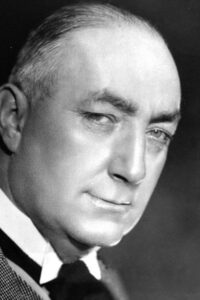
The Duke in the Suburbs
They were both tall, both dressed in grey, but one was older than the other. The younger man was clean-shaven, with a keen brown face and steady grey eyes that had a trick of laughing of themselves. The other might have been ten years older. He, too, was clean-shaven, and his skin was the hue of mahogany.
A close observer would not have failed to notice that both hands were enormous, as the hands of men used to manual labour.
They stood on either side of the tiled path that led through the strip of the front garden to the door and watched in silence as their modest property was rapidly unloaded.
Willie Outram, frankly a reporter, mentally noted the absence of piano, whatnot, mirror, and all the paraphernalia peculiar to the Kymott Crescent drawing room. He saw bundles of skins, bundles of spears, tomahawks (imagine his ecstasy!), war drums, guns, shields, and trophies of the chase. Bedroom furniture that would disgrace a servant’s attic, camp bedsteads, oversized lounge chairs, and divans. Most notable absentee from the furnishings was She—a fact which might have served as food for discussion for weeks but for the more important discovery he made later.
A man—servant busied himself directing the removers, and the elder of the two tenants finally said, “That’s finished, Duke.”
He spoke with a drawling, lazy, American accent. The young man nodded and called the servant.
“We shall be back before ten,” he said in a pleasant voice.
“Very—good, m’lord,” replied the man with the slightest of bows. The man looked round and saw Willie.
“Hank,” he said, “there’s the information bureau—find out things.”
The elder jerked his head invitingly, and Willie sidled into the garden.
Read or download Book
Edgar Wallace
Richard Horatio Edgar Wallace (1 April 1875 – 10 February 1932) was a British writer of sensational detective, gangster, adventure and sci-fi novels, plays and stories.
Biography.
Born into poverty as an illegitimate London child, Wallace left school at the age of 12. He joined the army at age 21 and was a war correspondent during the Second Boer War for Reuters and the Daily Mail. Struggling with debt, he left South Africa, returned to London, and began writing thrillers to raise income, publishing books including The Four Just Men (1905). Drawing on his time as a reporter in the Congo, covering the Belgian atrocities, Wallace serialized short stories in magazines such as The Windsor Magazine and later published collections such as Sanders of the River (1911). He signed with Hodder and Stoughton in 1921 and became an internationally recognized author.
After an unsuccessful bid to stand as Liberal MP for Blackpool (as one of David Lloyd George’s Independent Liberals) in the 1931 general election, Wallace moved to Hollywood, where he worked as a scriptwriter for RKO. He died suddenly from undiagnosed diabetes during the initial drafting of King Kong (1933).
Wallace was such a prolific writer that one of his publishers claimed he wrote a quarter of all books in England. As well as journalism, Wallace wrote screenplays, poetry, historical non-fiction, 18 stage plays, 957 short stories, and over 170 novels, 12 in 1929 alone. More than 160 films have been made of Wallace’s work.
In addition to his work on King Kong, he is remembered as a writer of “The Colonial Imagination”, for the J. G. Reeder detective stories, and for The Green Archer serial. He sold over 50 million copies of his combined works in various editions, and The Economist in 1997 described him as “one of the most prolific thriller writers of [the 20th] century”. However, most of his books are out of print in the UK but are still read in Germany. A 50-minute German TV documentary was made in 1963 called The Edgar Wallace Story featured his son Bryan Edgar Wallace.
Life and work
Ancestry and birth
Wallace’s great-grandfather was entertainer James Henry Marriott, and his grandmother was actress Alice Marriott. Wallace was born at 7 Ashburnham Grove, Greenwich, to actors Richard Horatio Marriott Edgar (1847–1894) and Mary Jane “Polly” Richards, née Blair (born 1843).
Wallace’s mother’s family had been in show business, and she worked in the theatre as a stagehand, usherette, and bit-part actress until she married in 1867. Her husband, Captain Joseph Richards, was born in 1838 to an Irish family. He and his father, John Richards, were both Merchant Navy captains, and his mother, Catherine Richards, came from a mariner family. Joseph died at sea in 1868, leaving his pregnant wife destitute. After the birth of Wallace’s older sibling, his mother returned to the stage, assuming the stage name “Polly” Richards. In 1872, she met and joined the Marriott family theatre troupe, managed by Alice Marriott, her husband Richard Edgar, and her three adult children (from earlier liaisons), Grace, Adeline, and Richard Horatio Marriott Edgar.
Wallace’s parents had a “broom cupboard” style sexual encounter during an after-show party. Discovering she was pregnant, his mother invented a fictitious obligation in Greenwich that would last at least half a year and obtained a room in a boarding house where she lived until her son’s birth on 1 April 1875. During her confinement, she had asked her midwife to find a couple to foster the child. The midwife introduced Wallace’s mother to her close friend, Mrs Freeman, a mother of ten children, whose husband George Freeman was a Billingsgate fishmonger. On 9 April 1875, his mother took Wallace to the semi-literate Freeman family and made arrangements to visit often.






